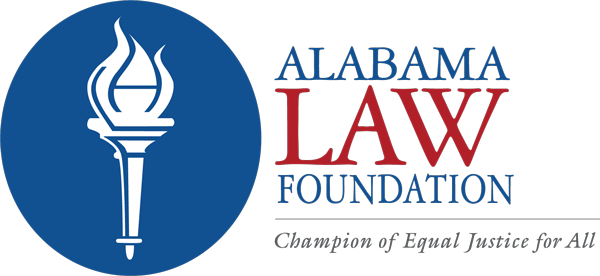Info for Banks
What is IOLTA?
IOLTA stands for Interest on Lawyers’ Trust Accounts. Attorneys routinely receive client funds to be held in trust for future use. Funds of a substantial amount or which are to be held for a long period of time are usually placed in an interest-bearing account for the individual client’s benefit. If funds are small in amount or to be held for a short period of time, they are usually pooled in a noninterest-bearing checking account. This is done because the interest generated by these funds, after bank charges and administrative fees, would not be enough to benefit the individual client.
The IOLTA program, authorized by the Supreme Court of Alabama on May 5, 1987, allows attorneys to convert their noninterest-bearing trust accounts to interest-bearing accounts. The interest from these accounts is remitted at least quarterly to the Alabama Law Foundation, Inc., a charitable, tax-exempt entity.
What does the program do?
The interest generated by the IOLTA program is used by the Alabama Law Foundation to make grants in the following categories: to provide legal aid to the poor; to provide law student loans; to provide for the administration of justice; to provide law related educational programs to the public and to county law libraries.
Since the first grants of IOLTA funds were awarded in 1989, the Alabama Law Foundation has awarded over $17 million for charitable, law related purposes. The existence of IOLTA has allowed us to make progress in meeting the needs of the poor for civil legal services through funding of pro bono projects and legal services. The foundation has also funded projects to improve the administration of justice and to provide law related education for the public. A number of county law libraries have been recipients of IOLTA grants.
Do IOLTA programs operate successfully in other places?
Yes. IOLTA programs have established successfully in all 50 states. Florida established the first IOLTA program in the United States in 1981. IOLTA programs have also operated successfully in a number of Canadian and British jurisdictions for many years.
Are there legal barriers to financial institutions offering IOLTA accounts?
No legal barriers exist but there may be practical issues, mostly in the data processing area, which participating financial institutions can easily overcome. The foundation can offer financial institutions assistance in complying with the rule.
Which financial institutions can offer IOLTA accounts?
Any eligible institution may offer IOLTA accounts. “Eligible institution” means any bank or savings and loan association authorized by federal or state laws to do business in Alabama, whose deposits are insured by an agency of the federal government, or any open-end investment company registered with the Securities and Exchange Commission and authorized by federal or state laws to do business in Alabama. Eligible institutions must meet the requirements set out in section (g) of Rule 1.15.
May a different interest rate be paid on IOLTA accounts than is paid on other interest-bearing accounts?
Financial institutions that offer IOLTA accounts must pay the highest interest rate or dividend generally available from the institution to its non-IOTA account customers when IOTA accounts meet or exceed the same minimum balance or other account eligibility qualifications, if any.
How often must interest be paid?
Interest must be remitted, less reasonable fees, at least quarterly to the Alabama Law Foundation, Inc. The interest should be calculated on an average monthly balance in the account, or as otherwise computed in accordance with the institution’s standard accounting practice.
What are the reporting requirements?
Financial institutions must send a report least quarterly to the Alabama Law Foundation. The report should include the following information: 1) the period for which the remittance is made, 2) the name of the lawyer or law firm from whoseIOLTA account the remittance is being sent, 3) the IOLTA account number, 4) the rate of interest applied, 5) the gross interest or dividend earned during the period, 6) the amount and description of any service charges or fees assessed during the period, 7) the net amount of interest or dividend remitted for the period. A copy of the report should also be sent to the attorney or law firm.
May attorneys still invest money in behalf of clients if they participate in IOLTA?
Yes. Funds of a substantial amount or that are to be held for long periods of time should be invested in an interest-bearing medium for the individual client’s benefit in an account established specifically for that client. Funds affected by IOLTA are funds pooled in a noninterest-bearing account by the attorney because they are small in amount or to be held for a short period of time, and would not generate enough interest to benefit the individual client, after bank charges and administrative fees.
What are the tax consequences of participation in the program?
There are none to the attorney or the client. The Alabama Law Foundation, Inc., which receives the interest income, is tax-exempt. The Internal Revenue Service stated in Revenue Ruling 81-209 that the interest earned on nominal and short term client advances, which is paid over to a bar foundation pursuant to a court-established program, is not includable in the gross income of any client.
How do financial institutions benefit from participation?
Participation in IOLTA can be seen as a community service by banks and can result in favorable coverage by the news media. Financial institutions in some states use their IOLTA accounts as a way to attract new customers.
